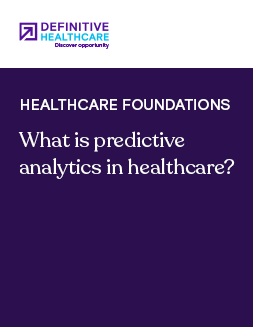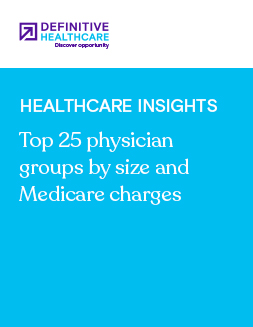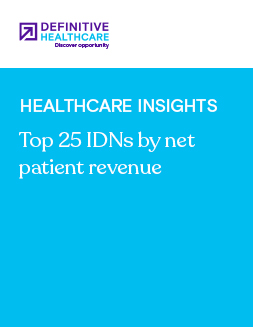Healthcare Insights
What are the top diagnoses at psychiatric hospitals?
Psychiatric hospitals are inpatient healthcare facilities designed and staffed to treat people with severe mental illnesses or impairments. These hospitals provide support for patients in crisis or whose symptoms present a risk to themselves or others.
Our HospitalView product tracks 820 active psychiatric hospitals in the U.S. as of April 2023.
Using data from the Atlas All-Payor Claims dataset, we’ve compiled a list of the most common diagnoses behind patient visits to psychiatric hospitals. Keep reading to see which diagnoses top the list.
| Rank | Diagnosis code | Description | % of patient visits at a US psychiatric hospital (2022) | Explore dataset |
|---|---|---|---|---|
| 1 | F332 | Major depressive disorder, recurrent severe without psychotic features | 11.9% | Explore |
| 2 | F1120 | Opioid dependence, uncomplicated | 6.8% | Explore |
| 3 | F250 | Schizoaffective disorder, bipolar type | 3.9% | Explore |
| 4 | F331 | Major depressive disorder, recurrent, moderate | 3.5% | Explore |
| 5 | F411 | Generalized anxiety disorder | 3.5% | Explore |
| 6 | F1020 | Alcohol dependence, uncomplicated | 3.1% | Explore |
| 7 | F3481 | Disruptive mood dysregulation disorder | 2.9% | Explore |
| 8 | F209 | Schizophrenia, unspecified | 2.8% | Explore |
| 9 | F333 | Major depressive disorder, recurrent, severe with psychotic symptoms | 2.5% | Explore |
| 10 | F329 | Major depressive disorder, single episode, unspecified | 2.5% | Explore |
| 11 | F319 | Bipolar disorder, unspecified | 2.3% | Explore |
| 12 | F29 | Unspecified psychosis not due to a substance or known physiological condition | 2.1% | Explore |
| 13 | I10 | Essential (primary) hypertension | 1.9% | Explore |
| 14 | F4310 | Post-traumatic stress disorder, unspecified | 1.9% | Explore |
| 15 | F840 | Autistic disorder | 1.7% | Explore |
| 16 | F339 | Major depressive disorder, recurrent, unspecified | 1.7% | Explore |
| 17 | F322 | Major depressive disorder, single episode, severe without psychotic features | 1.6% | Explore |
| 18 | F902 | Attention-deficit hyperactivity disorder, combined type | 1.6% | Explore |
| 19 | F200 | Paranoid schizophrenia | 1.3% | Explore |
| 20 | F314 | Bipolar disorder, current episode depressed, severe, without psychotic features | 1.2% | Explore |
Fig. 1 Analysis of diagnosis data from Definitive Healthcare’s Atlas All-Payor Claims dataset for calendar year 2022.
Which diagnoses are most responsible for patient visits to psychiatric hospitals?
Recurrent and severe major depressive disorder without psychotic features is the most common diagnosis at U.S. psychiatric hospitals, responsible for 11.9% of all visits to these facilities in 2022.
Also known as clinical depression, this disorder is defined by persistent and overwhelming feelings of sadness and disinterest in daily activities. Variations of major depressive disorder on this list account for 23.8% of patient visits to psychiatric hospitals in 2022.
The second most common diagnosis at U.S. psychiatric hospitals is opioid dependence without additional medical complications, representing 6.8% of patient visits. An estimated 3 million Americans live with opioid use disorder, a broader category that includes addiction and dependence.
Bipolar-type schizoaffective disorder is third on our list, responsible for 3.9% of psychiatric hospital visits in 2022. This disorder features the presence of schizophrenia symptoms like hallucinations or delusions along with episodes of mania and major depression.
What mental health services are offered at psychiatric hospitals?
Psychiatric hospitals typically offer mental health services aimed at patients with especially severe symptoms, such as suicidal or homicidal ideation, long-term sleep or food deprivation, or aggressive hallucinations or delusions.
These services center on stabilizing, monitoring, medicating, administering fluids and nutrition, and providing any necessary emergency care to the patient.
Following stabilization, a patient may receive medical treatments to reduce or control symptoms, participate in group or individual psychotherapy, and receive guidance on coping strategies and/or relapse prevention.
Learn more
Healthcare Insights are developed with healthcare commercial intelligence from the Definitive Healthcare platform. Want even more insights? Start a free trial now and get access to the latest healthcare commercial intelligence on hospitals, physicians, and other healthcare providers.


